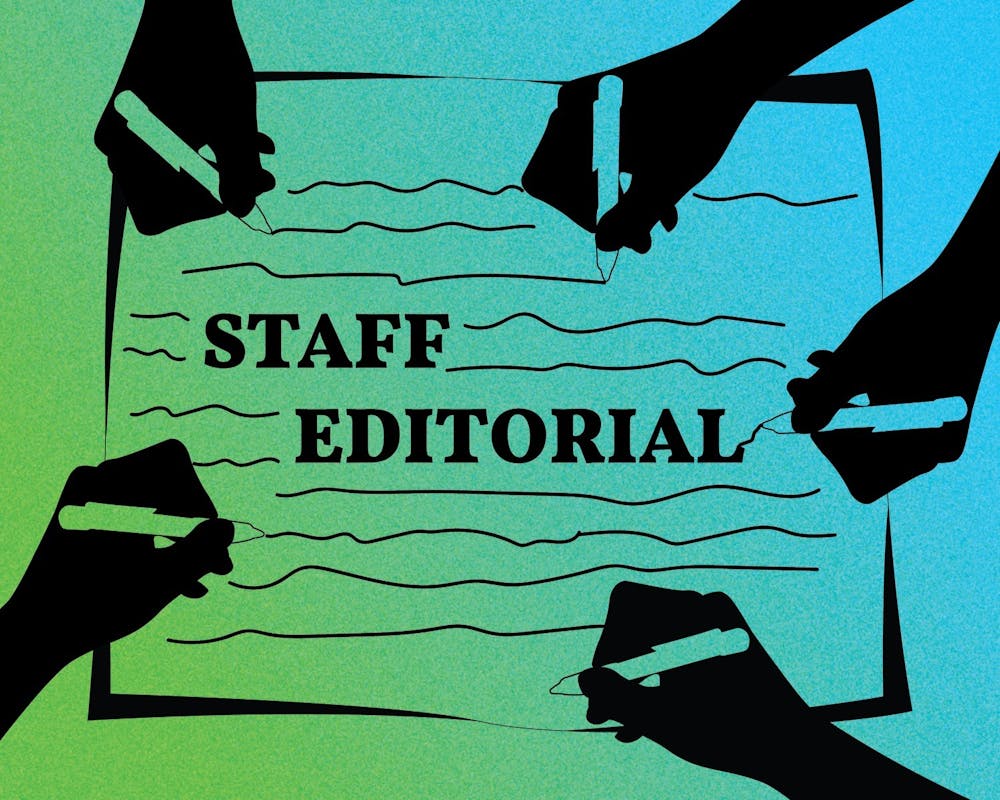The members of the Editorial Board who reported on and wrote: “‘Resign.’: How Jason Osborne’s tenure as Miami’s provost came to an end” recused themselves from and had no part in this Editorial Board discussion.
On April 11, Miami University’s then-provost, Jason Osborne, announced his resignation from his position, effective June 30. Today, The Miami Student published a detailed investigative story about the resignation, including previously undisclosed survey results gathered from faculty about Osborne’s tenure.
As an Editorial Board, The Student was disappointed, but not surprised, at the previous administrative culture that came to light due to this report.
The Student reported on the results of the survey, which detailed poor scores on average in regard to Osborne and his job performance. Osborne will remain at Miami as special assistant to the president until the end of this year, then, in accordance with his initial contract, transition to a tenured faculty position over the next year and beyond.
Osborne’s third-year report was not published as a result of his resignation.
We are displeased.
As a result of this reporting, an administrative culture, which protects its image before its community, has gained a new foundation.
We, as an Editorial Board, believe the report should have been published, and that the decision from the president’s office not to publish the report is emblematic of a long-upheld status quo across the board.
The previous provost at Miami held the position for four years. Osborne held it for less than three years. The system of three and five-year reviews is both broken and unhelpful. The review process of high-ranking Miami administrators should be both on a rolling basis and take individual comments more seriously. This could help dismantle the aforementioned status quo.
There should also be a modified first-year, scheduled review for new administrators rather than waiting for three years to hear feedback. This is especially true for a position as important and influential as that of provost.
The survey was facilitated by Miami’s Qualtrics and was anonymous, though some complained about certain questions that suggested phrasing could reveal identities.
There is a clear fear of retribution for full honesty among faculty members. That is not okay.
Enjoy what you're reading?
Signup for our newsletter
The university has also come to a point where it is not listening to feedback from students, faculty and staff alike, and Miami has failed to live up to this standard before.
In the summer of 2020, at the height of burgeoning Black Lives Matter (BLM) protests, a retired Miami professor — who, although retired, was still teaching online summer courses — allegedly called BLM protesters Uptown “monkeys.” His name was Douglas Brooks.
A change.org petition was created the same day, June 4, 2020, calling for Brooks’ removal. Over 20,000 people had signed the petition by Oct. 12, 2022.
He was not fired.
Instead, an email was sent out (ironically enough, by former Provost Osborne himself) discussing the allegations, and Brooks stepped down from his position in a situation reminiscent of former Provost Osborne’s.
In both of these instances at Miami, faculty members and administrators were not removed after 1,400 mostly negative comments or 20,497 petition signatures. It is unsurprising, but disappointing nonetheless.
It has come time for Miami to be a great deal better when it comes to the handling of staff and faculty concerns.
We need proactive transparency and an active feedback loop.
We do not think it should have taken Freedom of Information Act (FOIA) requests to see the results of a survey that highlighted important faculty voices and should have been published in the first place.
It should have been finished, published and distributed to the community.
Miami must change a culture that hides its failures, wrongdoings and allegations and become forthcoming. This change would foster a community much happier with its administrative structure.
Allowing the truth to come to light would show that Miami is not just in it for the aesthetic reputation — they would show true caring for their students and faculty.
A faculty that claims to be disrespected and unheard also means a student body that feels the same. We value transparency, and we care about the experience of all Miamians. Top-down approaches don’t work for us, and the perspectives of our faculty, staff and students matter.




